Neuroscience Institute: Mind on the brain
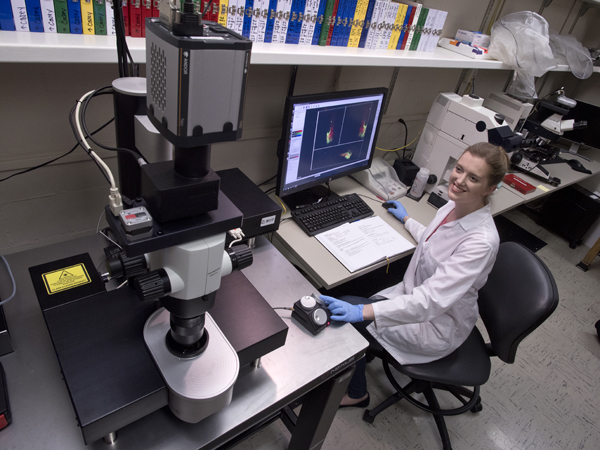
Published in News Stories on April 28, 2016
A new Neuroscience Institute at UMMC has a translational approach that scientists and clinicians expect will translate into better care for Mississippians.
UMMC received formal permission to create the institute (NSCI) from the State Institutions of Higher Learning on April 21. After several years of planning, the anticipated start date is July 11, 2016.
Dr. Michael Lehman, professor and chair of neurobiology and anatomical sciences, has chaired the NSCI working group since 2013.
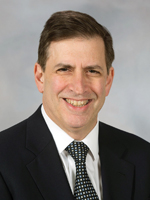
Lehman
“If we are to understand how the brain works normally, and what goes wrong in brain disease, then we need an integrated approach,” Lehman said. “We have to combine expertise and perspectives from many disciplines and specialties.”
The NSCI is a collaborative effort between the UMMC academic departments of neurobiology and anatomical sciences, psychiatry and human behavior, neurology and neurosurgery, as well as University Hospital administrators and Methodist Rehabilitation Center.
The goal is to integrate high-quality clinical care, groundbreaking research, and innovative, multidisciplinary educational programs. The institute will complement and build upon existing areas of strength to discover new cures and develop improved treatments.
UMMC's “triple threat” strength as an academic medical center - health care, education and research - makes it an ideal location for the NSCI, Lehman says.
“Neuroscience institutes at other universities and hospitals are often focused on either basic science or clinical service, and rarely all three missions,” Lehman said.
The NSCI will start by developing its own triple threat by focusing on stroke, neurotrauma and substance addiction as the first additions to a diversified portfolio.
The initial clinical goals include stroke care expansion and certification, an addiction treatment service, and a comprehensive neurotrauma program.
“Because UMMC is the only Level 1 trauma center in Mississippi, we receive the majority of traumatic brain injury and acute spinal cord injury patients in the state,” said Dr. Louis Harkey, professor and chair of neurosurgery.
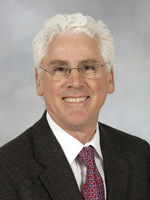
Harkey
“The added value of the Neuroscience Institute comes from the collaborative efforts that bridge our clinical departments.”
Harkey, a member of the NSCI working group, says that the institute is an integral part of an affiliation agreement between UMMC and MRC, approved by the IHL in 2014.
“Mississippians will benefit from this institute which will elevate UMMC and MRC's respective clinical, academic and research programs,” said Mark Adams, CEO of MRC.
As part of the affiliation, the physicians and nurse practitioners at MRC will join the staff at UMMC as part of the newly created Department of Rehabilitation Medicine. This will combine their complementary strengths and capabilities with UMMC's expertise early in the patient's acute medical care.
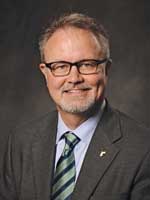
Adams
“Under the institute's umbrella, they will be working with other UMMC physicians and clinical staff from day one to advance the patient's outcome,” Adams said. “Our NSCI clinical care model will provide seamless care that takes patients from the emergency room to the ICU bed to the therapy gym and beyond.”
“MRC has a fantastic clinical and chronic care facility that will allow us to study the full continuum of acute and chronic injuries,” Lehman said.
To advance basic research, NSCI will recruit scientists to create and build on existing programs and apply for external funding.
The UMMC and MRC affiliation also promises progress for the hospitals' independent research departments.
“By sharing resources, we avoid redundancies and conduct more cost-effective research,” said Dr. Dobrivoje Stokic, administrative director of research at MRC and chair of the NSCI ad-hoc research work group. “And there's also a community benefit because adoption of innovation to clinical practice is faster where collaborative research takes place.”
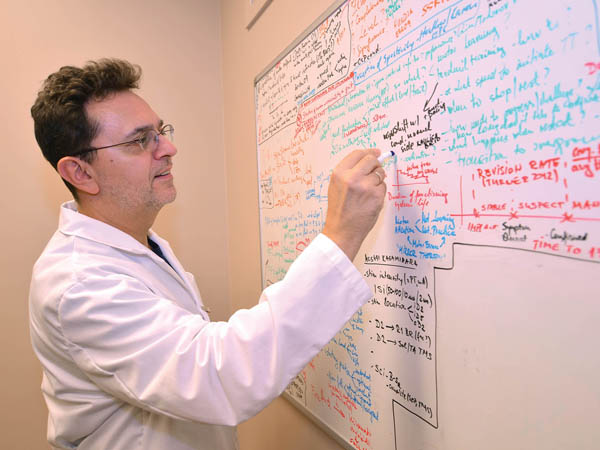
Stokic
Furthermore, Lehman says that NSCI hopes to use space in the new Translational Research Center, scheduled to finish construction in 2017.
“The NSCI is a collaborative amongst departments and specialists including basic scientists and clinicians that brings their combined skills and resources together to solve problems across all three missions,” said Dr. Richard Summers, associate vice chancellor for research. “It is a natural platform for the translational perspective in research.”
Education is the third part of the institute's mission. NSCI will oversee UMMC's Ph.D. program in neuroscience and develop a first-year medical neuroscience course as part of a long-term plan to create a longitudinally integrated four-year neuroscience curriculum.
Another goal is to develop a physical medicine and rehabilitation residency program in conjunction with MRC. The residency program would introduce medical students to the specialty, Harkey says.
“The best source of doctors for a state is from the state's own residency programs,” Harkey said. “If we can train physiatrists (rehabilitation specialists), then we may have more physiatrists to provide services here in Mississippi.”
UMMC leadership has been supportive of the institute throughout the planning process.
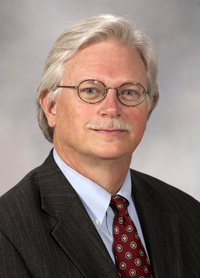
Summers
“The modern practice of clinical medicine is moving toward a more personalized and precision medicine approach,” Summers said. “The collaborative framework developed by the NSCI could be a model for the institution moving forward in the translational approach to research and the practice of precision medicine at UMMC.”
Lehman hopes the Neuroscience Institute will become a model for institutes at other academic medical centers and says UMMC is a prime location to test the model.
“UMMC is not so large that we cannot bridge the boundaries between different departments, schools and units,” he said. “And the congenial atmosphere here makes this an ideal environment to try something new.”


